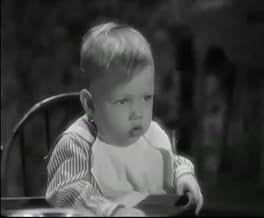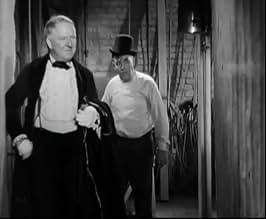Aggiungi una trama nella tua linguaThe Great McGonigle and his troupe of third-rate vaudevillians manage to stay one step ahead of the bill collectors and the sheriff.The Great McGonigle and his troupe of third-rate vaudevillians manage to stay one step ahead of the bill collectors and the sheriff.The Great McGonigle and his troupe of third-rate vaudevillians manage to stay one step ahead of the bill collectors and the sheriff.
- Regia
- Sceneggiatura
- Star
- Premi
- 2 vittorie totali
- Girl in Audience
- (non citato nei titoli originali)
- Mr. Livingston
- (non citato nei titoli originali)
Recensioni in evidenza
The film, as such, relies more on atmosphere than the typical Fields 'sketches' and this, perhaps, lends it a charm - and a freshness - that it wouldn't otherwise possess. Among its many notable scenes are: Fields thinking the military reception waiting at the train station is for his troupe's benefit; the dinner sequence with a rampaging, famished troupe and Fields' hilarious encounter with Baby LeRoy (who throws food at him and drops his watch into a jar of molasses) - Fields manages to get even with the child by kicking him when no one's watching!; the rich old lady's cringe-inducing singing audition, with the star reacting accordingly (he's hoping to secure her financial backing for the play the troupe will be presenting in town by promising her a role in it - this is eventually whittled down to a single line, which she's never even called upon to deliver!); Fields falling off the stage during rehearsals, etc.
"The Drunkard" set-piece occupies a good deal of the second half: a hoary melodrama which the troupe performs with gusto - with Fields as the mustachioed and hissable villain of the piece who, at one point, reprises the immortal line from his short THE FATAL GLASS OF BEER (1933) "'T ain't a fit night out for man nor beast". With the closing of each act, the curtain comes crashing down making a loud thumping sound; still, the film is clearly intended as a valentine to the days of vaudeville - and even includes a wonderful juggling routine towards the end that showcases Fields' amazing dexterity (in spite of his advancing age, corpulent physique and propensity for booze).
The final sequence finds The Great McGonigle keeping busy as a medicine showman - having left his daughter behind, so as not to interfere with her happiness alongside a stage-struck boy emanating from a respectable family. Typically, for comedies from this era, romance and songs have been incorporated into the narrative as much as a device by which to counterbalance the star's antics as for purely commercial reasons (since these films were largely intended for family consumption).
Because Fields was in his mid-50s when he made this film he was able to turn the tables, in a sense: instead of reprising his real-life role as a starving young actor he'd graduated by this time to the role of the unscrupulous manager, known here simply as The Great McGonigle. McGonigle leads a ragtag troupe of players who are touring the hinterland in that ever-popular temperance warhorse, "The Drunkard." As our story begins this troupe is fleeing a town one step ahead of the sheriff, and heading for their next engagement in the village of Bellefontaine, where prospects don't look much better. In desperate need of cash, McGonigle is compelled to woo a local wealthy widow who aspires to the stage, the magnificently named Cleopatra Pepperday (played with appropriate magnificence by Jan Duggan), while in the meantime his daughter is wooed by a college boy who also dreams of performing. The boarding house where the troupe stays serves as the locale for two hilarious comic set-pieces, back-to-back: first, McGonigle's lunch is ruined by Mrs. Pepperday's rowdy toddler Albert, who flings food in his face, grabs his nose, and dunks his pocket watch in molasses. And then, as if he hadn't been punished enough already, McGonigle must listen to Mrs. Pepperday's spirited rendition of "The Sea Shell Song."
These two sequences alone are reason enough to make this movie a must-see comedy classic, and, interestingly, in each of them Fields himself plays victimized straight man: first to Baby LeRoy, then to Jan Duggan, whose rendition of the song is a show-stopping triumph. Fields' reactions to both of these characters are priceless, but it's also worth pointing out that in this instance the notoriously paranoid, cantankerous W.C. Fields, who was said to be deeply jealous of other comedians, generously shared the spotlight with not one but two fellow players -- one of whom was a baby! -- and permitted each to temporarily steal the spotlight, to the ultimate benefit of the project.
The movie's finale consists of the troupe's performance of "The Drunkard" plus a sentimental song or two, and, best of all, McGonigle's juggling act. This extended sequence feels like an authentic recreation of just what an evening at a small-town theater of the period would have been like, from the cheap-looking sets and declamatory acting styles to the heavy curtain that hits the stage with a crash after each scene. The juggling routine is a special treat, as it represents the most complete filmed record of Fields' legendary feats of legerdemain. My only complaint is that there are a few too many cut-away shots showing audience members' reactions; I'd have been perfectly happy to watch the whole routine in a couple of uninterrupted takes, with no reaction shots at all. But in any event, the juggling act is wonderful.
According to a recent biography of W.C. Fields by James Curtis The Old Fashioned Way suffered through a troubled gestation process. Just as the film was going into production Fields' original screenplay, entitled "Playing the Sticks," was found to be somewhat jumbled and too brief to sustain a feature-length movie. Apparently the savior of the project was an unheralded screenwriter named Jack Cunningham, then known primarily for his earlier work on Westerns such as The Covered Wagon and a couple of Douglas Fairbanks vehicles. It was Cunningham who reworked and expanded Fields' original script into the seamless story it became, and who chose to interpolate the sequences from "The Drunkard." He also persuaded Fields to dust off his old juggling act for the finale. If this background information is correct, then viewers owe a debt of thanks to Mr. Cunningham for his important contribution to this terrifically entertaining, funny, and nostalgic slice of theatrical Americana.
Lo sapevi?
- QuizW.C. Fields recreates his famous vaudeville juggling routine with the cigar boxes.
- BlooperBetty is described as the leading lady of the troupe--as one would expect, since she is The Great McGonigle's daughter. But she takes no part in the show; another actress plays the female lead.
- Citazioni
Dick Bronson: Mr. McGonigle, I've got to have some money.
The Great McGonigle: Yes, my lad, how much?
Dick Bronson: Two dollars.
The Great McGonigle: If I had two dollars, I'd start a number two company.
Dick Bronson: For two cents I'd quit.
The Great McGonigle: [to Marmaduke] Pay him off!
[Marmaduke gives him a two cent stamp]
- Curiosità sui creditiThe end credits are in 2 parts; the first contain the actors and their character names in the film as a whole; The second contains the actors and their character names in the play, "The Drunkard." Five actors, therefore, are credited twice: W.C. Fields, Joe Morrison, Judith Allen, Samuel Ethridge and Ruth Marion.
- ConnessioniFeatured in Hollywood: The Gift of Laughter (1982)
- Colonne sonoreWe're Just Poor Folks Rolling in Love
(1934) (uncredited)
Lyrics by Mack Gordon
Music by Harry Revel
Sung by Joe Morrison
I più visti
Dettagli
- Data di uscita
- Paese di origine
- Lingua
- Celebre anche come
- The Old Fashioned Way
- Luoghi delle riprese
- Azienda produttrice
- Vedi altri crediti dell’azienda su IMDbPro
- Tempo di esecuzione1 ora 11 minuti
- Colore
- Proporzioni
- 1.37 : 1
Contribuisci a questa pagina































